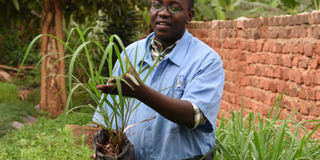Nyanzi minting millions from citronella plant

Julius Nyanzi explains the agronomy of the citronella plant . Photos by Ismael Kezaala
Curiosity continues to drive Julius Nyanzi to expanding his research on natural species beyond the traditional box. Omukenkufu, as peers refer to him, Nyanzi first hit the news pages when at 24 years, then a fresh graduate of Makerere University with a bachelor’s of science degree came up with a mosquito repelling system to curb the rising case of malaria cases among Ugandan children.
Soon he was starting Prof Bio Research Company to further his dream followed by acquisition of a two-acre piece of land in Masanafu along Hoima road to grow various crops particularly stevia (sugar equivalent). Nyanzi says he grows and process plants such as lemon grass, rosemary, citronella and stevia on this farm.
Citronella more than a plant
“Our fore fathers used Citronella (Omuteete or Teete) to repel mosquitoes and that is where I based my research to process the plant leaves to get a repellant,” he reveals at his main offices on Equatorial Mall (room 152) in Kampala.
It does not end here; Citronella can also repel other insects such as ticks, mites name it.
Making value addition
“We add value to it by extracting a more concentrated perfume which can be used to repel all crawling insects. The citronella component in the perfume disguises the smell of human beings to avoid being a target of mosquitoes,” the botanist reveals.
Nyanzi elucidates that mosquitoes do not see at night but through the scent of lactic acid in humans, they are able to trace their targets.
He says he is happy to have found a natural alternative remedy to malaria, the number one killer of children in the country.
His company has tried various forms of citronella byproducts which is user-friendly. Apart from perfumes, they sell creams and soaps. He calls citronella grass a natural relaxer used by native doctors to serenade their clients through its aroma.Interestingly, the grass can grow by its own or it is planted with a space of two feet in lines.
How citronella curbs ticks in cattle
Nyanzi says citronella is a very viable plant and it is a raw material, for many natural products. “We make perfumes that repel ticks from the cattle because they tend to hate strong smell. Buffaloes that eat citronella grass in the wildness are never attacked by ticks like cattle.
We recommend putting 20 drops in 20 litres of water a cow is going to drink. Shortly, the dosage will circulate to hides,” he says.
Citronella as a cosmetic
Nyanzi adds that citronella can also be used in cosmetic industry as soap brands world over are using this grass to produce quality products.
“We are training the workers at our offices to produce citronella perfumes that can help take away bad odour especially amongst the adolescents.”
Citronella doesn’t need a preserve because it repels other bacteria. It has protective oil which we extract during the distillation process.
Benefits
For the ladies that cherish beauty, citronella creams and soap work on waxes and eczema whilst making the skin more relaxed. It encourages an anti-aging skin, removes lactic acid, can be used in washing clothes and often used in massage parlours.
Butchers need not to get into the argument of whether to use the ‘lethal’ formalin to repel flies, citronella has the lasting remedy. Because it is edible, most people use it as tea leaves. For poultry farmers, citronella can be used in deworming chicken by applying recommended drops in the water.
More value
Nyanzi further advices people allergic to shampoo in their hair to turn to citronella, yet the same can apply to women with oily skins that attract dust. Citronella helps first time mothers during delivery as a sedative the same way it is used as aromatherapy by people with sleeping troubles in saunas and spas.
High yields
The prices of products from Nyanzi’s Prof Bio research company at Equatorial mall vary from Shs3,000 to Shs100,000 depending on the technologies used to produce them.
He has a countrywide market to feed and employs more than 40 workers.
Bananas and tomatoes
For banana farmers, citronella spray can be applied to repel nematodes that suck nutrients out of the plants.
Nyanzi advises that citronella grass can alternatively be planted on the hedges of the plantation or intercropped. The same can be done to crops such as maize, tomatoes and cassava thus avoiding diseases such as the dreadful tomato wilt.
Challenges
Nyanzi decries that high power tariff he incurs at his processing plant in Masanafu since it is not an industrial area. He also bemoans the farmers that burn down citronella grass not aware that they are erasing ‘gold’.
He adds that there is low yield since it takes him one kilogramme of citronella grass to get 100mls of perfume. At the moment Nyanzi relies on his garden and some out-growers to supply his production but he says the perception amongst farmers that citronella is not profitable like other crops holds him back.
The farmer is an Organic researcher, you can reach him on +256702061652 or +256779519652.




